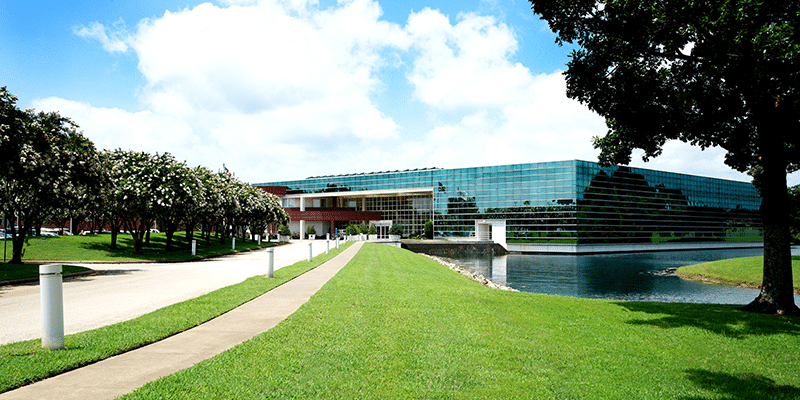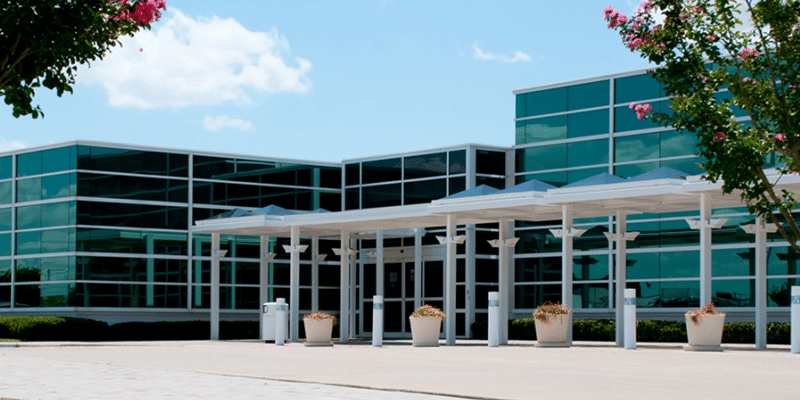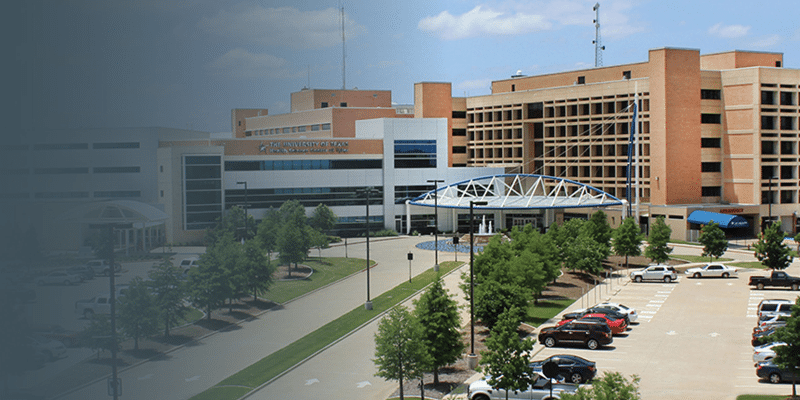Expert urology care in East Texas: Advanced treatments for kidney, bladder, and prostate health
At UT Health East Texas, our team of expert urologists is dedicated to providing the highest standard of care for a wide range of urological conditions. From state-of-the-art bladder and prostate care to vasectomies and urinary incontinence treatments, our urology clinic is equipped with the latest technology to provide urological treatments you can depend on. Whether you need treatment for kidney stones, incontinence, or prostate issues, trust our fellowship-trained physicians to deliver compassionate, comprehensive care tailored to your unique health needs.

Our urologists provide care for a wide range of urological conditions, including:
- Benign prostatic hyperplasia (BPH)
- Bladder cancer
- Condyloma (genital warts)
- Erectile dysfunction
- Elevated prostate-specific antigen (PSA)
- Hematuria
- Impotence
- Kidney cancer
- Kidney stones
- Low testosterone
- Overactive bladder
- Penile cancer
- Peyronie’s disease
- Prolapsed bladder
- Prostate cancer
- STD panel
- Testicular cancer
- Urinary incontinence
- Urinary tract infections (UTIs)
- Ureteral cancer
We are proud to be able to provide a wide range of treatments to care for these conditions. Using advanced technology and minimally invasive techniques whenever possible, our urology specialists offer services like prostate cancer treatments, oral and injectable medications for impotence, nephrolithotomy and lithotripsy for kidney stones, and urological surgical procedures.
Click below to explore our urology services in greater detail.
Aquablation therapy
Aquablation therapy is the only real-time, ultrasound-guided, robotic-assisted heat-free waterjet for the treatment of benign prostatic hyperplasia (BPH). At UT Health East Texas, we are proud to be the first in the region to offer this advanced, minimally invasive treatment. The HYDROS™ Robotic System is designed to deliver an accurate and consistent treatment plan for better clinical outcomes.
Aquablation therapy is a resective procedure, which means that the prostate tissue causing symptoms is surgically removed. No incision is made in the abdomen, as the prostate is reached through the urethra. Aquablation therapy is performed in a hospital and is done under anesthesia. The procedure typically takes less than an hour and involves an overnight stay.
How does the procedure work?
There are two key steps to the Aquablation procedure:
Step 1: Surgical planning
Every prostate is unique in size and shape, and Aquablation therapy is the only surgical procedure for BPH that combines next-generation ultrasound imaging with digital cystoscopy (a procedure that uses a small camera to examine the bladder and urethra). With the help of ultrasound imaging, our surgeons can create a detailed guide to plan the procedure, outlining the critical anatomy and suggest an optimal treatment plan for each patient. The tissue within the marked area of the prostate may be removed, while the tissue outside of it may remain untouched. This real-time visualization allows your surgeon to map which parts of your prostate to remove and which parts to avoid, specifically enabling them to avoid removing areas that could cause irreversible complications like erectile dysfunction, ejaculatory dysfunction and incontinence.
Step 2: Prostate tissue removal
Once your surgeon has created a surgical map, a robotic-assisted heat-free waterjet follows the surgeon-defined treatment plan and resects the obstructive tissue. This advanced technology helps ensure precise, consistent and predictable removal of the tissue across a wide range of prostate sizes and shapes.
When required, your surgeon may use a minimal amount of cautery following an Aquablation therapy procedure to control bleeding.
Side effects of aquablation therapy
We know that the primary reason men are delaying surgery is because they are concerned about side effects. In fact, a recent survey shows that 85% of men are concerned that surgery will cause incontinence, and four out of five men are concerned that surgery will have a permanent impact on their sexual function. In clinical studies, men who had Aquablation therapy had a very low rate of irreversible complications, such as incontinence, ejaculatory dysfunction or erectile dysfunction.
Post-surgical recovery
As with most benign prostatic hyperplasia procedures, you will wake up with a catheter following Aquablation therapy, which allows you to urinate while your urethra heals. The procedure may involve an overnight stay in the hospital.
The benefit with Aquablation therapy is that most patients end up leaving the hospital without a catheter. Once you’re home, you may notice for several weeks a mild burning sensation and urinary urgency, a sudden and intense need to urinate that is difficult to hold off. This can be managed with mild pain medication. Patients can resume their normal activities once approved by their doctor.
Is aquablation right for you?
Aquablation therapy has a very low rate of irreversible complications (incontinence, ejaculatory dysfunction or erectile dysfunction) because:
- It is the only procedure that gives surgeons the ability to view the entire prostate so they can create a map that avoids the parts of the prostate that cause irreversible complications.
- It is the only procedure that uses a heat-free waterjet to remove prostate tissue. Technologies that use heat to remove prostate tissue may be damaging to the parts of the prostate that control erectile function and ejaculatory function. It should be noted that surgeons may use a minimal amount of cautery following an Aquablation therapy procedure to control bleeding.
Aquablation therapy is the only procedure that resects prostate tissue with a robotically controlled waterjet, designed to minimize human error and ensure the prostate tissue is removed precisely, consistently and predictably.
In clinical studies, Aquablation therapy has also been shown to provide long-term relief at five years. Take the International Prostate Symptom Score (IPSS) Quiz to measure how severe your symptoms are. For more information about this procedure, visit aquablation.com or call us at 903-262-3900.
Bladder control care
Urinary incontinence, or urine leakage, is caused by weakened muscles or nerve problems involved in bladder control. In women, pressure on muscles and nerves during pregnancy and vaginal delivery increase their risk as well as hormonal changes during menopause.
There are two types of incontinence:
- Overactive bladder – Urinary incontinence occurs when the brain tells the bladder to empty or when the bladder muscles are overactive. In both cases, there will be an uncontrollable and strong urge to urinate and one must rush to the restroom or risk leakage.
- Stress urinary incontinence – Urine leakage when pressure is placed on the bladder. Sneezing, laughing, coughing, physical exercise and lifting may trigger urine leakage. Stress incontinence develops due to a stretched or weakened pelvic floor muscles.
Incontinence treatment
Overactive bladder treatment usually involves relaxing the muscles with oral medication or Botox injections to stimulate nerves, which normalizes the communication between the bladder and the brain.
Stress urinary incontinence treatment begins with weight loss to alleviate stress on the muscles and Kegel exercises to strengthen the muscles. The next step may be a sling surgery to support the muscle where the surgeon creates a “sling” out of tissue. The sling is then put under the urethra. The sling lifts the urethra to the neck of the bladder to help prevent leaks. Most sling surgeries are minimally invasive, completed in the office and do not require a hospital stay.
Impotence treatment
If it is difficult keeping a healthy erection, and it is affecting your self-esteem and confidence, our team of urologists can help. We offer treatment services for men of all ages with impotence, also known as erectile dysfunction.
Impotence can occur when blood flow is restricted in the penis. Men can experience it occasionally because of stress or negative emotions, however it can be a side effect of underlying medical conditions such as diabetes, heart disease or high blood pressure. Men may also develop erectile dysfunction if they develop atherosclerosis, when arteries begin to harden.
Impotence is diagnosed after reviewing symptoms, medical history, lifestyle and stress factors. Your provider will also perform a physical exam, check blood pressure and check your prostate.
Treatment
There are oral and injectable medications available for recurring impotence. However, if conservative treatments are not enough to treat erectile dysfunction, you may be a candidate for penile implant surgery. Most penile implant procedures are outpatient procedures with a relatively short recovery period.
Kidney stone treatment
Kidney stones are one of the most common conditions that urologists treat. Most stones form in the kidney itself and may not cause pain until the stone moves down the ureter. Then the kidney may not be able to drain properly, causing pain from the increased pressure.
There are different kinds of kidney stones, including:
- Calcium stones – These are the most common type of kidney stones, which are created from calcium oxalate. Oxalate is found naturally in certain foods. The risk of developing calcium oxalate stones increases if someone consumes foods high in oxalates.
- Cystine stones – These are stones caused by rare, metabolic disorders that prevent kidneys from removing cysteine out of urine.
- Struvite stones – These stones are caused by an infection, such as urinary tract infections.
- Uric acid stones – These are stones created from uric acid crystals in urine. Someone is more likely to develop uric acid stones if they don’t drink enough fluids, lose too much fluid or eat a high protein diet.
Symptoms of kidney stones
You may have kidney stones if you are experiencing any of the following symptoms:
- Cloudy urine
- Nausea and vomiting
- Pain during urination
- Pain that comes in waves and varies in intensity
- Pain that radiates from your lower abdomen to groin
- Pink, red or brown urine
- Severe pain in the side and back
- Urinating more often than normal
Kidney stone treatment
If the kidney stone is small enough, it is treated by letting the stone pass through the body. Sometimes shock wave technology or lasers are used to dissolve the kidney stones. Drinking plenty of water and taking over the counter painkillers help move moderately sized kidney stones pass through the urinary tract. This process is usually quite painful.
When the kidney stones are too large to pass naturally through urination, your urologist may perform treatments such as neurolithotomy, extracorporeal shockwave lithotripsy or ureteroscopy with laser lithotripsy.
Prostate cancer care
At UT Health East Texas, we understand how stressful it can be to receive a cancer diagnosis. That’s why our urologists provide compassionate cancer care every step of the way on your cancer journey.
Prostate cancer is the most common cancer found in men. In many cases, this is a slow-growing cancer that can be detected at an early state with routine exams. Prostate cancer begins when cells in the prostate grow too large. Most prostate cancers, called adenocarcinomas, originate in the glands that produce the fluid that forms semen. Because prostate cancer is slow growing, it is rare in men under 40.
Urogynecology services
Urogynecology specializes in the treatment of women with pelvic floor disorders. These disorders arise when the pelvic muscles are weakened or connective tissue is damaged due to childbirth, repeated strenuous activity, menopause, chronic disease, or pelvic surgery. Other contributing factors include heavy lifting, tobacco use, and genetics.
Vasectomies
A vasectomy is one of the most reliable forms of birth control, with results that are nearly 100% effective for preventing pregnancy. The procedure prevents sperm from entering semen, but does not affect any other sexual functions.
How are vasectomies performed?
Vasectomies are performed in office, under light sedation. The vas deferens is a tube that carries sperm from the testes to the urethra. A vasectomy cuts the vas deferens, removes a small segment, then closes the two ends. This prevents the sperm from getting into the semen.
The surgeon will make a small incision in each scrotum, pull the tubes through the incision, cut them and tie the ends.
What to expect after your vasectomy
Discomfort and swelling is normal after a vasectomy. You will receive instructions from your provider on how to care for the incision site. You may need to use cold packs and take over-the-counter pain medications. You will need to limit activities for a few days, however most men are cleared to return to usual activities within a week, including sexual intercourse.
Using birth control after your vasectomy
After your vasectomy, you are not sterile right away. It will take a few months for the sperm that were in the vas deferens before the procedure to pass through the reproductive tract. As a rule of thumb, it will take about three months or around 20 ejaculations to clear out the sperm.
Your urologist is able to check sperm samples and inform you when it is safe to have unprotected intercourse. Until then, you should use another form of birth control to prevent pregnancy.
Reversing vasectomies
Vasectomies are intended to be permanent, however it is usually possible to reverse the procedure. The success rate is based on other factors, such as the length of time since the procedure.





